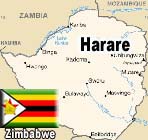Swearing-in of Zimbabwe deputy ministers promises more turmoil
 Harare- Deputy ministers and ministers of state are due to be sworn in later Thursday in Zimbabwe's new power-sharing government, with further chaos expected as their numbers exceed the limit set out in the country's amended constitution.
Harare- Deputy ministers and ministers of state are due to be sworn in later Thursday in Zimbabwe's new power-sharing government, with further chaos expected as their numbers exceed the limit set out in the country's amended constitution.
State radio reported that 25 deputy ministers and ministers of state were to be sworn in by President Robert Mugabe at a ceremony at State House, the president's ceremonial office in Harare, but, according to legal experts, the law provides for only 15 deputy ministers, and no ministers of state.
Lawyers also said it looked unlikely that Roy Bennett, Prime Minister Morgan Tsvangirai's deputy agriculture minister-designate, who is being held on charges of plotting insurgency, would be allowed attend the ceremony after a magistrate on Wednesday refused him bail. However, his name was on the list read out on state radio.
Lawyer Tinoziva Bere said they were filing applications at the High Court in Harare for Bennett to be granted bail, but he was not optimistic it would be heard before the swearing-in ceremony.
Supporters of Tsvangirai's Movement for Democratic Change (MDC), including Bennett's wife, Heather, have been demanding that the MDC refuse to attend the ceremony until Bennett is released.
Chaos reigned last week at the swearing-in of full ministers when Mugabe arrived with a list of seven more than the 15 allocated to his Zanu-PF party in the power-sharing accord with the MDC.
The agreement is aimed at kickstarting an economic turnaround in Zimbabwe, which has been plunged into crisis by a decade of increasingly populist policies under Mugabe, 84.
A cabinet of 36 ministers was finally agreed on by the three parties to the accord, including a breakaway MDC faction led by science professor, Arthur Mutambara.
"There is absolutely no provision for ministers of state or additional ministers in the agreement," Veritas, a legal monitoring organisation said.
"This is not sending out the right signals that the new government will respect constitutionalism and the rule of law."
The fresh additions will push the size of the new government up to 61 ministers, ministers of state and deputy ministers - what constitutional experts say will be the largest government since Zimbabwe gained independence from Britain in 1980.
In the terms of the agreement, there should only have been 46.
Reports in Zimbabwe describe fierce infighting, including exchanges of blows, between former ministers in Mugabe's previous government trying to secure a place in the new transitional government.
"The new dispensation meant that half of them would be out of a job, and would lose all their perks and cars and patronage," one Western diplomat said on condition of anonymity. "None of them want to be left out." (dpa)